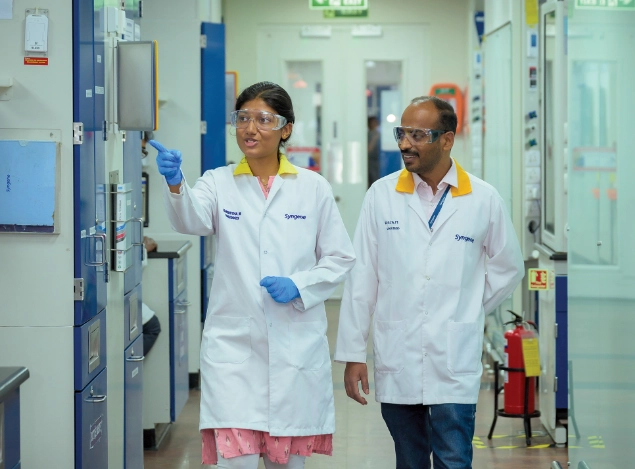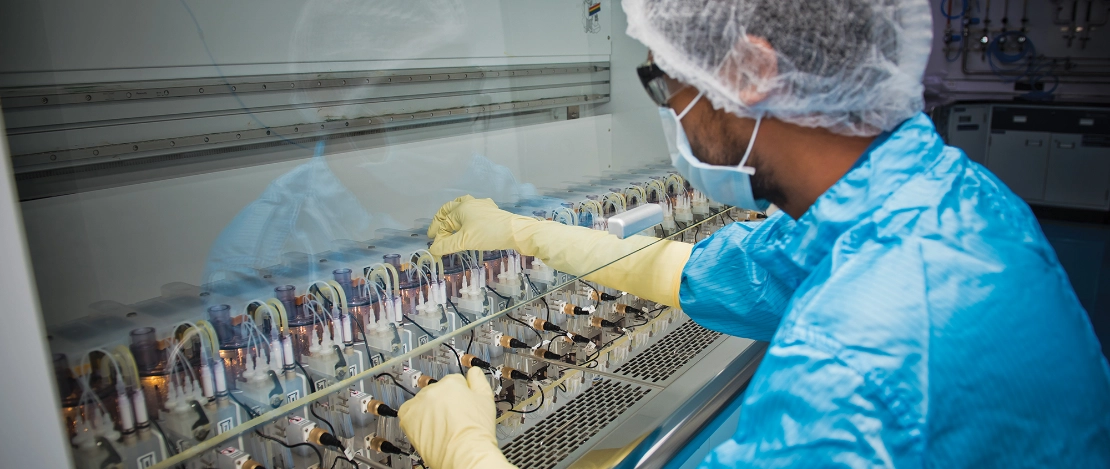


The Company celebrated 30 years of scientific excellence in November 2023. Initially founded on synthetic and medicinal chemistry, its scope was steadily broadened to foster integrated innovation across multiple therapeutic areas and modalities. From addressing simple research problems, today the Company partners with some of the world’s leading scientists in solving complex challenges and consistently delivering world-class solutions.
Aligned with our clients’ requirements for innovation delivered with speed and efficiency, Discovery Services leverages cutting-edge technology and automation to deliver accuracy and traceability to every project. SynVent™, our platform for integrated drug discovery from target validation to preclinical development, encompasses traditional small molecules, biologics and antibody‑drug conjugates, and targeted protein degradation. In addition, our AI platform, Syn.AI™, accelerates innovation by analyzing vast datasets, identifying effective means of targeting diseases at the cellular and molecular level and optimizing molecular properties for successful drug development.
We continue to invest in research infrastructure to accommodate growth and additional capabilities. New facilities have been commissioned on our main campus in Bangalore.
Despite softer demand for CRO services, we sustained our excellent track record in scientific accomplishments and project delivery to meet of client expectations. After experiencing high levels of funding during the pandemic years, funding declined during the year. In the early months of fiscal year 2025, funding is returning to the biotech sector. Since biotechs often outsource their research and development activities – with funding in place – we expect to capture our share of this activity in the second half of the current fiscal year.
Among highlights for the year, the generation of four potential drug candidates in the biologics space demonstrates our agility and expertise in delivering solutions. Additionally, the successful completion of proof-of-concept studies for multiple clients positions Syngene favorably for larger projects in the year ahead.
In the field of animal health, we continued to deliver innovative solutions. Unlike human health, animal health presents a range of species-specific challenges, with variations in protein structures significantly affecting treatment effectiveness. Our animal health workflows in Syn.AI™ enable us to translate human biology to data-driven hypotheses in animal species as part of repurposing of human targets and therapeutics for animals.
Other innovation included projects to apply Syn.AI™ beyond life sciences by delivering effective solutions for rational design of better, sustainable fuels, extending our predictive modelling expertise into the energy sector.
A 17-acre land parcel was purchased in Genome Valley, Hyderabad, as an extension to our existing research campus. This expansion gives us the headroom to grow over the next decade. Construction of new facilities on the acquired land is scheduled to commence in 2024, following the necessary statutory approvals.
Interest in small molecule-adjacent modalities like peptides and oligonucleotides is on the rise, driven by a broader industry trend to explore diverse biological targets for therapeutic intervention. We continued to build on our capabilities in this area to meet this growing demand. We also strengthened our expertise in induced proximity with a focus on both targeted degradation and stabilization. With over 500 scientists dedicated to this field alone, we stand out as having one of the largest and most experienced teams in the industry.
Aligned with the growth of Discovery Chemistry services in Hyderabad, we initiated specific Discovery Biology services in the same location, including assay biology and drug metabolism and pharmacokinetics (DMPK). This reflects our broader strategy to co-locate essential capabilities for early-stage drug discovery. By providing these services in one place, we not only meet the fundamental needs of the drug discovery process but also address industry demands for speed, cost-efficiency, and quality. With the addition of an automated Central Compound Management facility, these elements position Hyderabad as a center of excellence for small molecule discovery.
Commissioning of Automated Central Compound Management Facility: Syngene’s automated central compound management (CCM) facility was created in collaboration with the Hamilton Company1 (Switzerland) and is a first-of-its-kind in India. This state-of-the-art facility acts as a repository for all compounds synthesized by Syngene. The CCM can store between half to one Mn compounds in controlled environments. The CCM is integrated with the Titian Mosaic2 software to provide inventory management, compound tracking, and secure web access for our partners. The fully automated CCM facility will increase efficiency, improve sample quality, and decrease project timelines. More importantly, assay-ready plates for DMPK and assay biology will be prepared in this facility through state-of-the-art automated liquid handling systems, enhancing precision and accuracy of data. All compounds and plates will be barcoded for ease of tracking.

DMPK and assay biology automation: In the highly competitive DMPK services marketplace, our in vitro ADME (absorption, distribution, metabolism and excretion) laboratory in Hyderabad features precision robotics and advanced bioanalytical tools to significantly increase our capacity, improve quality and reduce assay turnaround times. In parallel, the assay biology labs were upgraded to include the latest technology to support biochemical and cell-based assays.
Advanced science: Working at the leading edge of science, discovery teams completed induced pluripotent stem cell-derived assays, 3-D spheroidal cancer assays and multiple in vivo disease models. On the innovation front, our scientists generated a proprietary hERG cell line to look at off-target effects of drugs and created a proprietary llama antibody library for rapid identification of antibodies that bind to specific molecular targets implicated in disease. Other significant discovery work includes the creation of two proprietary bispecific antibody platforms to offer to our clients. We also improved our therapeutic antibody discovery efforts to increase success rates and decrease turnaround time and we successfully discovered and characterized two therapeutic antibodies for our clients which are currently in IND-enabling stages.
During the year, a strategic collaboration was established with a leading research organization based in Japan, enabling the execution of critical early-stage toxicology studies for small molecules. More than 20 non-GLP studies were completed utilizing the AMES colony counter and cyto study manager to expedite the delivery of AMES study results in our genetic toxicology laboratory.
Other notable achievements include: securing regulatory approval from the US FDA for preparatory work in advance of a clinical trial related to the marketing authorization of a biosimilar; development of a novel method for perineural injection, leading to the acquisition of new projects; and conducting the first-ever repeat dose intrathecal injection study for a novel oligonucleotide.
SARchitect™, Syn.AI™ and SynTIPS™ are important platforms and development work included the incorporation of feedback from pilot studies to enhance subsequent generations.
Syn.AI™ was expanded for mechanistic identification of targets. This enhancement will enable us to offer target identification and validation packages, further strengthening our integrated drug discovery offerings.
During the year, our molecule design capabilities were extended beyond life sciences to develop physics-based and AI workflows applicable to the energy and cosmetic sectors.
Early target safety assessment services were launched to assist organizations in evaluating target-associated safety concerns at the outset of a program in order to formulate a mitigation strategy. This approach helps to decrease the incidence of unexpected late-stage target-related safety issues.